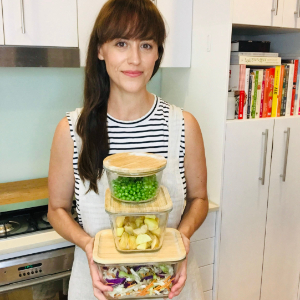Banish the Bloat: The Overlooked Digestive Enzyme Making Perimenopause Less...Gassy

Let’s talk about bloating. That uncomfortable, belly-like-a-balloon feeling that creeps in after meals and makes you question if your jeans have shrunk or your stomach's planning a rebellion. If you’re in perimenopause, chances are this is a familiar (and uninvited) guest at dinner.
Without the right support for digestion, perimenopause can make bloating worse, leave you sluggish, and rob you of nutrients your hormones desperately need. But it doesn’t have to be this way. You’re about to learn the one enzyme that can change everything, no weird cleanses, no salad-only diets, and no giving up chocolate. Promise.
I used to think I was eating "healthy." You know the drill: big salads, skipping bread, avoiding cheese like it personally offended me. But after every meal, I'd get hit with a bloated belly and the distinct feeling I had a brick slowly inflating in my gut. I’d go from calm to cranky in 60 seconds and wonder why my kombucha-fuelled diet wasn’t cutting it.
Turns out, there was one crucial thing I was missing. Let’s get into it.
Step 1: Understand what's actually going on
During perimenopause, your hormones are throwing their own version of a surprise party. One of the lesser-known party crashers? A dip in your body’s production of lipase – a digestive enzyme that helps break down fats.
Without enough lipase, you might notice:
- Persistent bloating that arrives before your dessert fork does
- A feeling of uncomfortable fullness, even if you didn’t eat much
- Poor nutrient absorption that messes with your hormones and energy levels
This enzyme doesn’t get the glory that probiotics do, but trust me, when it’s missing, your gut knows.
Step 2: Add In foods that bring lipase to the party
If your digestive system had a group chat, lipase would be the one who’s always late but absolutely essential. The good news? You can invite it in naturally through your meals.
Start including enzyme-rich foods like:
- Pineapple and papaya (yes, fruit that tastes like a cocktail counts as medicine)
- Fermented veggies like sauerkraut or kimchi (try not to eye-roll; they’re actually delicious when you find one you like)
- Sprouted seeds (chia and flax can do double duty for hormones too)
Don’t overthink it. Throw a spoon of sauerkraut on your plate, add some pineapple to your smoothie, and pat yourself on the back for being a nutrition goddess.
Step 3: Support your gut with the right fats
Here’s the plot twist: your body still needs fats. But it needs the right kind, the ones that work with your hormones, not against them.
Add these to your week:
- Avocados (the creamy kind, not the one that turns brown in 3 minutes)
- Olive oil (drizzle it like you’re on a Mediterranean cooking show)
- Wild-caught salmon (omega-3s for the win!)
These fats don’t just help your gut; they help hormones get back on speaking terms. Plus, they make meals more satisfying, which means less post-dinner pantry hunting.
Step 4: Put it all together (without losing your mind)
You don’t need to overhaul your entire kitchen or become a fermentation expert. Start small:
- Add one enzyme-rich food per day
- Drizzle olive oil like the Mediterranean gods intended
- Eat fat with fibre and protein (hello, blood sugar balance)
Bonus tip: Stop holding your stomach in all day. It doesn’t actually help with bloating, it just makes it harder to breathe and your organs slightly resent you.
Key takeaways:
- Bloating in perimenopause is common, but not normal; you can shift it with simple tweaks
- Lipase is the underrated hero your gut has been waiting for
- Enzyme-rich foods + good fats = digestion that doesn’t sabotage your day
- Knowing your archetype gives you the clarity (and plan) you need
Because no one should have to choose between hormones and hummus.
Ready to Beat the 3pm Slump?
(without giving up coffee or dessert)
If you’re tired of skipping lunch, battling cravings, and wondering why fat loss feels harder after 40, start here. Grab my Snack Box Lunch Guide to balance blood sugar, calm cravings, and keep energy steady all day long.


